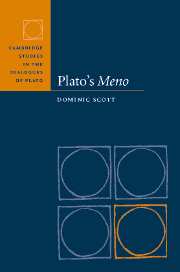Book contents
- Frontmatter
- Contents
- Acknowledgements
- Introduction
- Part I
- Part II
- Part III
- Chapter 11 The method of hypothesis: 86c–87c
- Chapter 12 Virtue is teachable: 87c–89c
- Chapter 13 Virtue is not teachable: 89e–96d
- Chapter 14 Virtue as true belief: 96d–100b
- 15 Irony in the Meno: the evidence of the Gorgias
- Chapter 16 Meno's progress
- Conclusion
- Appendices
- References
- Index of ancient passages
- General index
Chapter 14 - Virtue as true belief: 96d–100b
Published online by Cambridge University Press: 29 September 2009
- Frontmatter
- Contents
- Acknowledgements
- Introduction
- Part I
- Part II
- Part III
- Chapter 11 The method of hypothesis: 86c–87c
- Chapter 12 Virtue is teachable: 87c–89c
- Chapter 13 Virtue is not teachable: 89e–96d
- Chapter 14 Virtue as true belief: 96d–100b
- 15 Irony in the Meno: the evidence of the Gorgias
- Chapter 16 Meno's progress
- Conclusion
- Appendices
- References
- Index of ancient passages
- General index
Summary
OVERVIEW
When Socrates tentatively concludes that virtue is not teachable, Meno replies:
It seems not, if we've considered the matter correctly. So I wonder, Socrates, if there are any virtuous men, or what might be the way in which good men come into being.
(96d1–4)In response, Socrates revisits the argument that virtue is knowledge to show that they overlooked an important distinction. They were correct to say that virtuous people are beneficial, and that to be beneficial one must guide one's affairs rightly. What they failed to notice was that there are two ways of giving the right guidance. One is by knowledge, the other by true belief. True belief, so long as one has it, is as useful as knowledge. The problem is that it is not stable, and people with mere true belief are apt to change their minds. Only by chaining belief down with explanatory reasoning will they achieve the stability of knowledge (97e2–98a8). Returning to the political context of the dialogue, Socrates claims that Pericles and the other virtuous men guided the city's affairs correctly by true belief. Because they lacked any knowledge, he compares them to prophets and soothsayers who, under the influence of divine dispensation, say much that is true without any understanding. Similarly, the virtue of the eminent Athenians comes not by teaching but by divine dispensation (99e6).
- Type
- Chapter
- Information
- Plato's Meno , pp. 176 - 193Publisher: Cambridge University PressPrint publication year: 2006



